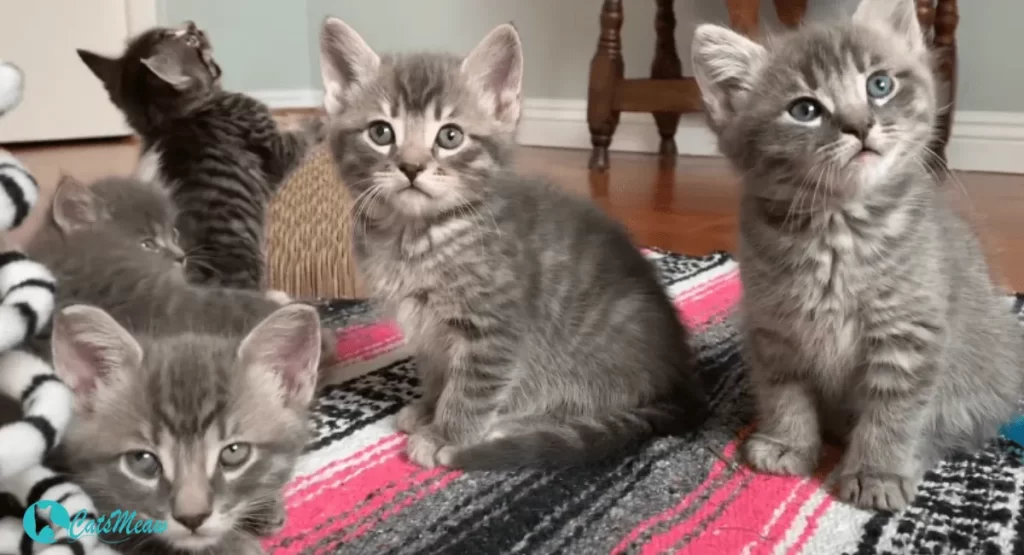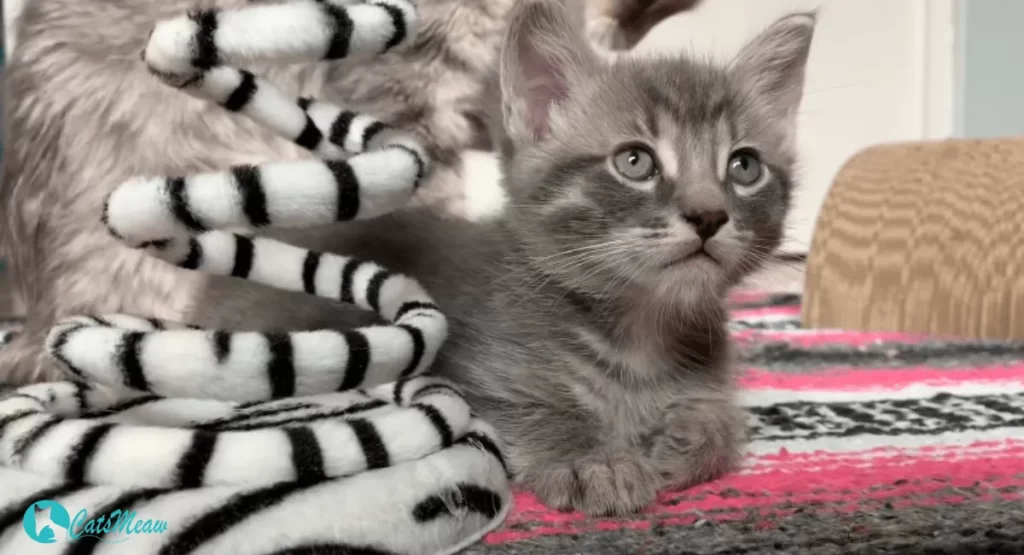At six weeks old, kittens enter a critical transitional phase. They begin exploring independence while benefiting from their mother’s care. Many wonder if these kittens are ready to be separated. While six week old kittens can eat solid food and display curiosity, their mom remains a vital figure in their lives. This article comprehensively examines six-week-old kittens’ care, feeding, grooming, and development needs.

Understanding the Development of a Six Week Old Kitten
At six weeks, kittens experience significant developmental milestones. Their motor skills, balance, and play behaviors improve dramatically. They become increasingly energetic, exploring their environment and interacting more with littermates.
Key Milestones for a Six Week Old Kitten:
- Improved coordination and balance
- Development of sharp baby teeth
- Transitioning to soft, solid foods
- Early social behaviors like play-fighting and grooming
While these milestones mark early independence, maternal care remains essential. Mother cats teach vital behaviors like grooming, hunting instincts, and boundaries. Kittens without their mom may lack these skills, leading to potential developmental gaps.
Can Six Week Old Kittens Eat Without Their Mom?
Yes, six week old kittens can eat independently, but the process requires guidance. Their digestive systems are sensitive at this stage, and proper nutrition is crucial. Soft kitten food or gruel mixed with milk replacers ensures they receive the necessary nutrients.
Steps to Introduce Solid Food:
- Use a high-quality kitten food mixed with milk replacer.
- Feed 3–5 tiny daily meals at body temperature (98–100°F).
- Gradually reduce the milk replacer as they adjust to solid food.
During this stage, kittens are messy eaters. Using shallow dishes and placing newspaper underneath makes cleaning easier. Monitoring each kitten during mealtime ensures they receive adequate nourishment.
Check feeding your cat tips for a more profound guide on transitioning kittens to food.
Do Six-Week Old Kittens Still Need Milk?
While six week old kittens can digest soft food, they may still benefit from supplemental milk replacers. Kittens rely on this nutrition to bridge the gap during weaning. Avoid feeding cow’s milk, as it can upset their sensitive stomachs.
Benefits of Milk Replacers:
- Provides essential proteins and fats
- Supports immune development
- Helps underweight kittens gain strength
By week eight, gradually phasing out milk replacers encourages kittens to rely solely on solid food. Without this careful transition, digestive upset or malnutrition may occur.
Read this guide on bottle-feeding kittens for more information about proper milk substitutes.
Why Grooming Matters for Six Week Old Kittens
Grooming plays a crucial role in a six-week-old kitten’s life. The mother cat grooms her kittens to keep them clean, stimulate blood flow, and teach them self-care. Kittens who lose maternal guidance require help from human caregivers.
How to Groom a Six Week Old Kitten Without Its Mom:
- Use a damp cloth or soft brush to clean their fur.
- Check for fleas or signs of skin irritation.
- Encourage self-grooming by gently brushing their coat daily.
Teaching kittens proper grooming habits ensures they grow into clean, healthy cats. If you notice fleas or signs of infection, consult a vet immediately.
For more grooming tips, explore this cat grooming guide.
The Role of Socialization in Six Week Old Kittens
Socialization is key to raising a well-behaved kitten. At six weeks, kittens learn social boundaries and acceptable behaviors by interacting with their mom and littermates. A mother cat disciplines her kittens gently, teaching them limits and how to interact appropriately.
Signs of Proper Socialization:
- Play-fighting without excessive biting or scratching
- Observing and mimicking maternal behaviors
- Developing curiosity without fear
If kittens are orphaned, human interaction replaces maternal teaching. Play with kittens regularly using safe toys and avoid rough handling. Proper socialization during this window reduces behavioral issues as they mature.
Discover more about fostering social development in this guide: introducing kittens to new environments.
Signs That a Six Week Old Kitten is Ready for Independence
While six-week-old kittens show signs of independence, complete separation from their mother may be premature. Look for these indicators to determine readiness:
- Eating solid food independently: Consistently consuming soft food without assistance.
- Weight gain: Reaching a healthy weight of 1–1.5 pounds.
- Litter box use: Demonstrating consistent litter box habits.
Even if kittens appear independent, they benefit from staying with their mother until eight weeks. Separation too early can lead to social and emotional challenges.
Check when kittens can leave their mom for more information on the ideal separation time.Six-week-old kitten
Check when kittens can leave their mom for more information on the ideal separation time.
How to Litter Train a Six Week Old Kitten
At six weeks, kittens begin showing an interest in litter box use. If their mother is absent, you must step in to guide them.

Litter Training Tips:
- Use a low-sided litter box for easy access.
- Place kittens in the litter box after meals or naps.
- Choose unscented litter that is safe for kittens.
Kittens learn quickly with consistent reinforcement. Keep the litter box clean to encourage use and prevent accidents.
If you’re having trouble placing litter boxes, read this resource on choosing the best location.
Health Concerns for Six-Week-Old Kittens
Six week old kittens remain vulnerable to health issues. Without their mother’s care, they are more prone to infections, malnutrition, and parasites. Proper monitoring and veterinary care ensure their health remains on track.
Common Health Issues in Six Week Old Kittens:
- Parasites: Fleas, worms, and mites
- Dehydration: Lack of proper water intake
- Malnutrition: Inadequate nutrient absorption
Schedule a veterinary check-up to ensure vaccinations, deworming, and overall wellness. Early intervention prevents complications.
For more about cat illnesses, check out this resource on common cat diseases and symptoms.
Do Six-Week-Old Kittens Miss Their Mom?
Yes, six-week-old kittens still rely emotionally on their mom. While they gain physical independence, they look to her for warmth, comfort, and reassurance. Her absence can cause mild stress or anxiety.
Signs a kitten misses its mother include:
- Increased vocalization
- Difficulty settling into new environments
- Reduced playfulness or appetite
Provide a warm, quiet space for orphaned kittens. Using soft blankets and stuffed toys mimics maternal warmth and comfort. Consistent human interaction also eases this transition.
How to Support Orphaned Six Week Old Kittens
Caring for a six week old kitten without its mother requires dedication and patience. To fill the maternal role, focus on these areas:
- Feeding: Provide soft food and fresh water. Use a milk replacer if necessary.
- Grooming: Clean their fur and check for signs of parasites.
- Socialization: Play daily to teach boundaries and reduce loneliness.
- Warmth: Ensure they sleep in a cozy, quiet area.
- Veterinary care: Schedule regular check-ups to monitor growth.
With proper care, orphaned kittens thrive and adapt to their new environment. For additional care tips, read this complete kitten care guide.
Conclusion
At six weeks, kittens begin exploring independence but still benefit from their mother’s presence. Six-week-old kittens can eat, play, and groom themselves with guidance. However, maternal care teaches essential social behaviors and emotional comfort. Human caregivers must provide food, warmth, grooming, and socialization to ensure healthy development if kittens are orphaned. Understanding these needs guarantees that kittens grow into thriving, happy cats.
